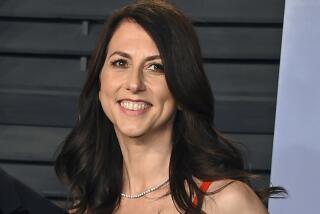Eight Californians receive MacArthur grants
Eight Californians, including a public high school physics teacher, a deaf sign-language expert, a jellyfish researcher and an installation artist, are among 23 winners of this year’s grants from the MacArthur Foundation.
The recipients will each receive $500,000 over the next five years, with no strings attached.
Included on this year’s list are a few celebrated names, such as David Simon, the Baltimore-based screenwriter of “The Wire,” the 2002-08 television series about the urban drug trade, and Annette Gordon-Reed, the Harvard law professor who has written about Thomas Jefferson’s relationship with a slave.
But most are academics and artists who have worked in relative obscurity and on Monday seemed awestruck by the honor. The MacArthur fellowships, started in 1981, reward people who are “making our world a better place for us all,” according to director Daniel J. Socolow.
Among them are Amir Abo-Shaeer, 38, who teaches engineering and physics at Dos Pueblos High School in Goleta, near Santa Barbara, and established an academy that specializes in hands-on learning about robotics, among other subjects. He said the money will give him the “freedom to be creative in a field that does not have a lot of funding.”
Abo-Shaeer said he saw the award as validation of the work many teachers are doing in public schools. “To be recognized is an amazing thing,” he said.
Carol Padden, a UC San Diego communication professor, spoke in an interview through a video connection with sign language translation of questions that she then answered in her own voice. The child of deaf parents who is deaf herself, Padden researches the structure and evolution of sign languages and their differences from spoken language and from each other.
Padden, 55, said Monday that she will use the award for further worldwide research and to advance her life’s work of showing “that sign languages belong in the class of human languages.”
John Dabiri, a Caltech expert on the underwater motion of jellyfish, will spend some of his grant on swimming lessons. “Oddly enough, I never learned to swim,” said Dabiri, 30, associate professor of aeronautics and bioengineering. “For once, it will be nice to study jellyfish from close up instead of from the other side of the glass.” The rest, he said, may go to helping younger scientists.
His work on how jellyfish generate jet-like forces has implications for man-made transportation and energy innovation, as well as for medical research on blood flow, he said.
Los Angeles artist Jorge Pardo, 47, has worked the fine line between art and design. His projects include his own home (once opened to the public as a Museum of Contemporary Art exhibit) and the exhibition hall for the Los Angeles County Museum of Art’s pre-Columbian galleries, which consists of undulating wood cabinets.
UC Berkeley had two winners: Dawn Song, 35, a computer security specialist, and economist Emmanuel Saez, 37, who studies the history and effects of tax policy. Stanford University geneticist Carlos Bustamante, 35, was recognized for DNA sequencing work that provides insights into human population migration and the domestication of dogs.
At UC Davis, creative writing professor Yiyun Li was praised for “emotionally compelling explorations” of her fictional characters, an achievement all the more remarkable because she began to write in English only after she moved to the United States in 1996, the foundation said.
Li, 37, said she hopes the award will allow “a little bit less teaching, a little more time to focus on writing.”
Television writer and producer Simon, whose current series “Treme” is about New Orleans, said he would probably give some of his grant to charity and may use some of it on future work. “I might want to pursue something that had minimal commercial value,” he said.
For a complete list of the winners, including a type designer, a honeybee expert and a jazz pianist, go to https://www.macfound.org
larry.gordon@latimes.com
Times staff writers Jori Finkel, Carolyn Kellogg and Melissa Maerz contributed to this article.
More to Read
Sign up for Essential California
The most important California stories and recommendations in your inbox every morning.
You may occasionally receive promotional content from the Los Angeles Times.











